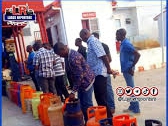
The remains of 26 Nigerian women believed to be migrants have been recovered from a Spanish warship in the Italian coast city of Salerno.
A report by the British Broadcasting Corporation on Monday said a Spanish warship, Cantabria, which docked in the city, was found to be carrying 375 rescued migrants and the dead women.
According to the report, 23 of the dead women were on a rubber boat with 64 other people.
It also quoted Italian media report that the women’s bodies were kept in a refrigerated section of the warship. Most of them were between the ages of 14 and 18.
UNHCR spokesman, Marco Rotunno, said the 26 dead were involved in a shipwreck off Libya.
Most of the 375 survivors brought to Salerno were sub-Saharan Africans from Nigeria, Senegal, Ghana, The Gambia and Sudan, the daily La Repubblica reports.
Among them were 90 women – eight of them pregnant – and 52 children. There were also some Libyan men and women on board.
The BBC said, “People-smuggling gangs charge each migrant about $6,000 (£4,578) to get to Italy, $4,000 of which is for the trans-Saharan journey to Libya, according to the Italian aid group L’Abbraccio. Many migrants have reported violence, including torture and sexual abuse by the gangs.
“Italian prosecutors are investigating the deaths of 26 Nigerian women – most of them teenagers – whose bodies were recovered at sea.
“There are suspicions that they may have been sexually abused and murdered as they attempted to cross the Mediterranean. Five migrants are being questioned in the southern port of Salerno.”
Nigerians slam FG, seek end to economic crisis
Reacting to the development, some notable bodies and individual Nigerians blamed the Federal Government, its agencies and the harsh economic situation in the country for the tragedy.
The Centre for Anti-Corruption and Open Leadership, said the Federal and state governments must tackle the rising rate of unemployment in the country to curb the menace of human trafficking.
The CACOL Director, Debo Adeniran, said, “The problems of illegal migration and trafficking are an accumulated issue. We have a high population of children and youths in this country and we are not planning for their future. Workplaces are actually winding up and no new jobs are springing up. This is why people want to leave and look for the proverbial ‘greener pastures.’
“The establishment of agencies such as NAPTIP (is commendable) but in recent times, some officials are complicit in some of these cases. Authorities need to pay more attention to these agencies, including the Nigeria Immigration Service. If our agencies do their work conscientiously, we will not have a lot of these problems.
“The important step by the government is to create more jobs for our youths and school-leavers. We need to ensure that we create an enabling environment for those who want to establish their own jobs.”
Activist lawyer, Mr. Ebun-Olu Adegboruwa, blamed illegal migration by citizens on economic hardship, which creates a sense of desperation.
He said though the blame could not be entirely put on the doorsteps of the current administration, the government had not done enough to address the question of citizens’ survival.
Adegboruwa said, “The situation of Nigeria has taught everyone to become a government to themselves. The government has neglected its responsibility under the constitution, which says that the welfare of the people shall be the primary purpose of government. The country we live in now does not recognise merit, even when you score high mark, they tell you, you can’t gain university admission because you are not from a particular part of the country; you can’t get a job, there is no health facility, there is no road; so, our youths are daily dying in the Sahara Desert on their way to Libya, on their way to Italy, to Europe and I think that this is a pointer to the fact that our economy is down.
“We live in a country where everybody is for himself and God for all. I believe the situation of the Nigerian economy does not offer hope for our youths; it does not offer hope for those who have no connections; and life is getting tougher by the day. So, I think that this event in particular is a pointer to the fact that our economy has not improved.
“Beyond what we read in the newspapers, Nigerians know what is happening in their homes, there is darkness. They know what is happening in their bank accounts – salaries are not paid, pension is not paid. So, people have lost their purchasing power and so the only option left is for our people to seek greener pastures because in those places that they are going to – America, Europe – the things that we are battling with here are taken for granted. Nigeria is killing its people. I do not think that this government is particularly the one to blame for it but I think it has not done enough to address the question of survival for the ordinary Nigerian and that is unfortunate.”
A Lagos-based lawyer, Mr. Monday Ubani, also blamed illegal migration on economic hardship.
Ubani said, “I don’t think there is any policy in place towards checking this kind of illegal migration; we see a lot of people perishing on the sea trying to migrate to Europe, to the so-called greener pastures and I don’t think there is any clear policy in place to discourage people. I know that Mrs. Abike Dabiri-Erewa has been in charge, trying to discourage Nigerians from such a fatalistic journey. But I don’t think there is a government structure or policy in place to ensure that Nigerians don’t embark on a journey like this.
“Apart from Nigeria, nationals of other African countries are also embarking on this dangerous journey, with many perishing on the sea. So, it is not peculiar to Nigeria.
“And in the Nigerian situation, it didn’t just start and it’s not peculiar to this administration. People have always had this wrong notion that immediately they cross over, they will pick money on the ground. As I speak to you, there are those who will be willing to spend N1m to cross over to go and hustle, not that they are going there as expatriate to get skilled employment.”
Similarly, the Chairman of the Civil Society Network Against Corruption, Mr. Olanrewaju Suraj, blamed the problem on institutional failure.
Suraj said, “To be fair, this is not something that can be attributed to a particular government. It has always been there and I think it is probably reducing not basically because the government is doing anything more but because people are getting more conscious of the hazards associated with such trips. For that reason, you can see a certain level of decline. But unfortunately, the government institutions are really not doing enough. You only see NAPTIP, RRS showing few individuals that were arrested for trafficking but there is really no conscious, holistic approach connecting all the security agencies.”
The National Legal Adviser of the Nigerian Bar Association, Chief Rafiu Balogun, and the Chairman, NBA, Ilorin branch, Mr. Issa Mazumah, identified acute unemployment, harsh economic environment, bad governance, corruption, insecurity, epileptic power supply and high crime rate as some of the reasons for the increasing rate of such illegal migration.
Balogun said, “It is sad that our youths are leaving this country for greener pastures abroad because they are not gainfully employed in this country. You can imagine that our able-bodied young people after graduating from universities are not employed.
“In other climes, they will plan ahead for their youths, as they are leaving tertiary institutions, they will be gainfully employed and even if they are not employed, they will have some social security or welfare programme that will sustain them.”
Mazumah said, “Many Nigerians, including my humble self, want to leave this country because of bad governance. The situation in the country is more frightening. There is serious or chronic unemployment, power failure or the lack of power, lack of critical infrastructure. Corruption remains a major problem.
“In fact, the other time, I was on a particular federal highway and to my dismay, I saw some members of the Nigerian Armed Forces collecting bribes on Nigerian road. The commercial vehicle drivers said he had no change and they asked him to wait and they changed the money, gave him the balance and took their bribe.”
Policy to curb illegal migration underway
When contacted, the spokesperson for the Ministry of Foreign Affairs, Dr. Tope Elias-Fatile, promised to get in touch with the Nigerian Mission in Rome, but he had yet to get back to our correspondent at 9:02pm.
However, responding to the incident, the Senior Special Assistant to the President on Foreign Affairs and Diaspora Matters, Abike Dabiri-Erewa, expressed government’s condolences to those who lost loved ones in the tragedy.
She also appealed to Nigerian youths to stop illegal migration through the Mediterranean or the desert.
She also revealed plans to unveil a comprehensive policy document to curb illegal migration.
Dabiri-Erewa also explained that she just returned from a summit on the issue from Adis-Ababa, the Ethiopian capital.
The presidential aide further explained that the document would be unveiled in July next year. According to her, the policy document is prepared to discourage African youths from risking their lives on the perilous journey to Europe through the Mediterranean and the Sahara Desert.
She revealed that no fewer than 5,000 Nigerians who emigrated illegally had been brought back to the country in the last six months.
Dabiri-Erewa said, “Fatalities are increasing on the Mediterranean because the smugglers are using smaller boats. I just returned from a summit in Adis-Ababa where we are coming up with a comprehensive irregular migration document. By July next year, a formal document would be unveiled. I hope it would assist in checking the sad trends.
“The migrants are going over there to work, so there is a way it could be properly regularised.
“Unfortunately, the part of Europe they are migrating to is no longer interested in saving anyone; they are tired. We are appealing to our youths to stop illegal migration.”
The SSA said that some agencies including the National Emergency Management Agency and the National Agency for Prohibition of Trafficking in Persons would soon hold a summit to also discuss the way forward on illegal migration by Nigerians.
The National Director, Press and Public Relations, NAPTIP, Mr. Josiah Emerole, could not be reached for comment on the deaths of the 26 Nigerians as of press time.
Calls to his mobile telephone indicated that it was switched off. A response to a text message sent to him on the subject was still being awaited as of the time of filing this report.
However, an official of the agency, who spoke on condition of anonymity because he was not authorised to speak to the media, said turbulence at sea especially across the Mediterranean during this time of the year was probably responsible for such high casualties. The source explained that criminal gangs usually targeted such periods to embark on the risky journey because they knew security patrols were less.
The source said they (smugglers) consider such periods “safe for trafficking.” The official further explained that, “We get no fewer than 300 returnees from Libya every week. They want to cross the Mediterranean into Europe, mostly into Italy and Spain. Some of them are stranded in Agadez, Libya, and have to be deported by authorities.
“Most of the victims go by land. They take buses from Edo, Kano, and others and it takes them approximately five days on land to get to Libya, from where most of them want to cross the sea.
“Deaths are common on the Mediterranean because the smugglers force their victims to wait till when the sea is safe, which to them means that security patrol is little.
“But the irony is that the patrol is little only when the sea is turbulent and thus, the traffickers push their victims aboard the ship and a wreck is inevitable.”
Punchng








